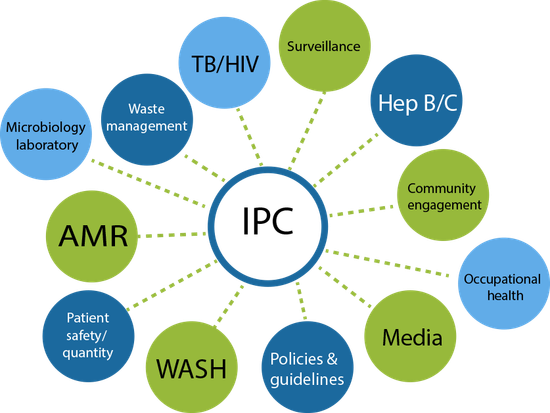
Leadership is an important part of a successful Infection Prevention and Control (IPC) programme. These skills can affect positive change in an IPC team, other leaders and health care staff, and lead to sustainable IPC programmes. In order to develop a sustainable programme, IPC leaders must have good project management and risk assessment skills and understanding of implementation strategies. We will also learn the importance of developing adequate education and training for health care workers in your facility. Implementing systemic changes is a challenge. With these leadership skills in place, you will gain a foundation that will allow you to build an effective IPC team, successfully manage IPC projects, and develop a sustainable IPC programme.
Please note: These materials were launched on 21/01/2021.
Язык: English
COVID-19
Информация о курсе
This course is also available in the following languages:
Français - Shqip - Azərbaycan dili - македонски -Հայերեն
Overview: In this course, we will explore characteristics of a leader and different types of leadership, and how leadership skills are essential for effective communication and conflict management. Additionally, we will explore the project management process and adult-based education for IPC, as well as the basics of implementation science and how multimodal strategies can support behaviour change and influence stakeholders.
Learning objectives: By the end of this course, you will be able to:
- define leadership as it applies to the roles and responsibilities of the IPC focal person;
- identify how characteristics and types of leadership relate to your own leadership approaches;
- define the components of communication and describe how they are used to communicate effectively in IPC;
- select the most effective channels of communication to use in various IPC situations;
- explain which leadership skills and behaviours are needed for optimal conflict resolution;
- explain how project management skills apply to developing a strong IPC programme;
- identify and categorize risk and risk management strategies as they apply to your IPC projects;
- apply adult learning theories to how you can approach education and training of health care workers in your facility;
- describe how the three factors of successful implementation—context, innovation, and recipients—define a framework for improving IPC activities;
- explain how understanding behaviour change can be used to develop and implement the best IPC interventions;
- select the best strategies to use when attempting to make low cost or no cost improvements; and
- develop quality improvement (QI) strategies that can be used to systematically improve processes and outcomes.
Course duration: Approximately 4 hours.
Certificates: A Record of Achievement will be issued to participants who receive at least 70% on the post-test. You have an unlimited number of attempts to meet the threshold. Participants who receive a Record of Achievement can also download an Open Badge for this course. Click here to learn how.
Содержимое курса
Module 1: Leadership skills :
Leadership is an important part of a successful IPC programme. In this module, we will explore characteristics of a leader and different types of leadership, as well as how leadership skills are essential for effective communication and conflict management. These skills can affect positive change in an IPC team, other leaders and health care staff, and lead to sustainable IPC programmes. With these leadership skills in place, you will gain a foundation that will allow you to build an effective IPC team and programme, while also acquiring credibility and influence within your facility.Module 2: Project management:
Leadership is an important part of a successful IPC programme. In this module, we will explore the project management process and adult-based education for IPC. These skills can affect positive change in an IPC team, other leaders and health care staff, and lead to sustainable IPC programmes. In order to develop a sustainable programme, IPC leaders must have good project management and risk assessment skills. We will also learn the importance of developing adequate education and training for health care workers in your facility. Implementing systemic changes is a challenge. With these leadership skills in place, you will gain a foundation that will allow you to build an effective IPC team, successfully manage IPC projects and develop a sustainable IPC programme.Module 3: Implementation strategies and quality improvement:
Implementation strategies help you create structured change and translate IPC standards into practice at the point of care in your facility. As the IPC focal person, it is important for you to understand how to develop and maintain IPC interventions. In this module, you will learn about the basics of implementation science. (For the purposes of this course, implementation science is a systematic, scientific approach to getting people and organizations to adopt interventions, evidence-based practices, and policies in health care settings). You will also learn how multimodal strategies can support behaviour change and influence stakeholders.Post-test: Leadership and programme management in infection prevention and control
Записаться на этот курс
Требования для получения сертификата
- Чтобы получить сертификат об окончании курса, участникам необходимо набрать не менее 70% от максимального количества баллов за все задания на оценку.
- Gain an Open Badge by completing the course.